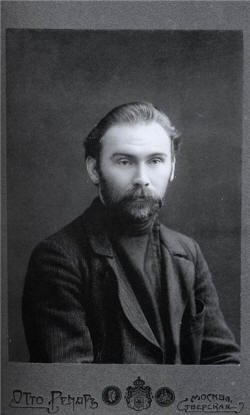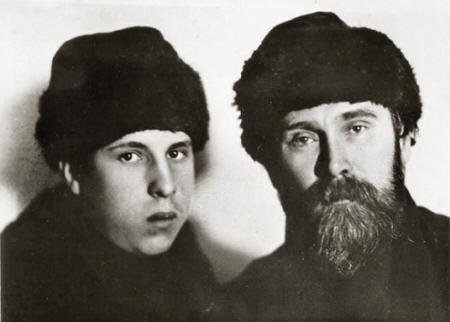

Partner Sergei Yesenin, Anatolii Kravchenko
Queer Places:
Vytegra, Oblast' di Vologda, Russia
 Nikolai
Alekseevich Klyuev (10 October 1884 - 23 October 1937), was a notable Russian
poet. He was influenced by the symbolist movement, intense nationalism, and a
love of Russian folklore. Sergei
Yesenin met Nikolai Klyuev, the leading figure in a group of 'peasant
poets', in 1915. They had an affair that lasted until 1917, and Yesenin
addressed several love poems to the older man. One of his biographers says `it
is clear that Yesenin met with the homosexual advances, not only of Klyuev,
but of others', for he was moving in a distinctly gay cultural environment;
and indeed, the writer coyly adds, He may have succumbed to the pressure of
the milieu and discovered in himself a latent bisexuality.' He later became
associated with the Russian Imagist movement, which included the poets Ryurik
Ivnev and Anatoly Marienhof,
both homosexual; and appears to have had a three-year affair with the latter.
However, Yesenin 'came to resent playing second fiddle to Klyuev' as a poet.
On 25 December 1925, he visited Klyuev and got a lukewarm response to poems he
read out. Some time early in the morning of 28 December, he hanged himself.
Nikolai
Alekseevich Klyuev (10 October 1884 - 23 October 1937), was a notable Russian
poet. He was influenced by the symbolist movement, intense nationalism, and a
love of Russian folklore. Sergei
Yesenin met Nikolai Klyuev, the leading figure in a group of 'peasant
poets', in 1915. They had an affair that lasted until 1917, and Yesenin
addressed several love poems to the older man. One of his biographers says `it
is clear that Yesenin met with the homosexual advances, not only of Klyuev,
but of others', for he was moving in a distinctly gay cultural environment;
and indeed, the writer coyly adds, He may have succumbed to the pressure of
the milieu and discovered in himself a latent bisexuality.' He later became
associated with the Russian Imagist movement, which included the poets Ryurik
Ivnev and Anatoly Marienhof,
both homosexual; and appears to have had a three-year affair with the latter.
However, Yesenin 'came to resent playing second fiddle to Klyuev' as a poet.
On 25 December 1925, he visited Klyuev and got a lukewarm response to poems he
read out. Some time early in the morning of 28 December, he hanged himself.
Born in the village of Koshtugi in Olonets Governorate (now Vologda Oblast) near the town of Vytegra, Kluyev rose to prominence in the early twentieth century as the leader of the so-called "peasant poets". Kluyev was a close friend and mentor of Sergei Yesenin. Arrested in 1933 for contradicting Soviet ideology, he was shot in 1937 and rehabilitated posthumously in 1957.
Klyuev was homosexual and had love affairs in Vytegra in the immediate post-revolutionary years, and before settling in St Petersburg in the 1920s. Nevertheless, by the 1920s the evidence of active homosexual relationships become more evident in the account of his life, as well as his poetry. In 1928 he me his great love, Anatolii Kravchenko, a young artist. The two lived as companions in Leningrad until Kravchenko's marriage in 1933, which came as a blow to Klyuev.
Homo-eroticism can be found in Klyuev's poetry from as early as the late 1910s. By the 1930s a more romanticised form of homosexual love is found addressed in the poems to Kravchenko.
However, documentary evidence remains scarce; as some suggest, one of the reasons is that scholars in Russia working on archival material have tended to treat issues of sexuality with some caution ; and homosexuality remains a taboo subject for Russian readers and students.[1]

Anatolii Kravchenko
and Nikolai Klyuev
Kluyev, whose work is thoroughly inspired with the spirit of the Old Believers, was the first in Russian literature who began to praise the innocence of the body. In his view, Christ had been homosexual. And his own homosexuality Kluyev explained (referring to the Paul the Apostle) was that "love justifies a multitude of sins, and love is mighty". Kluyev was also close to the sect of khlysts proclaiming the Dionysian approach to knowledge of Christ, specifically: knowledge not through spirit, but through the flesh.[2]
My published books: